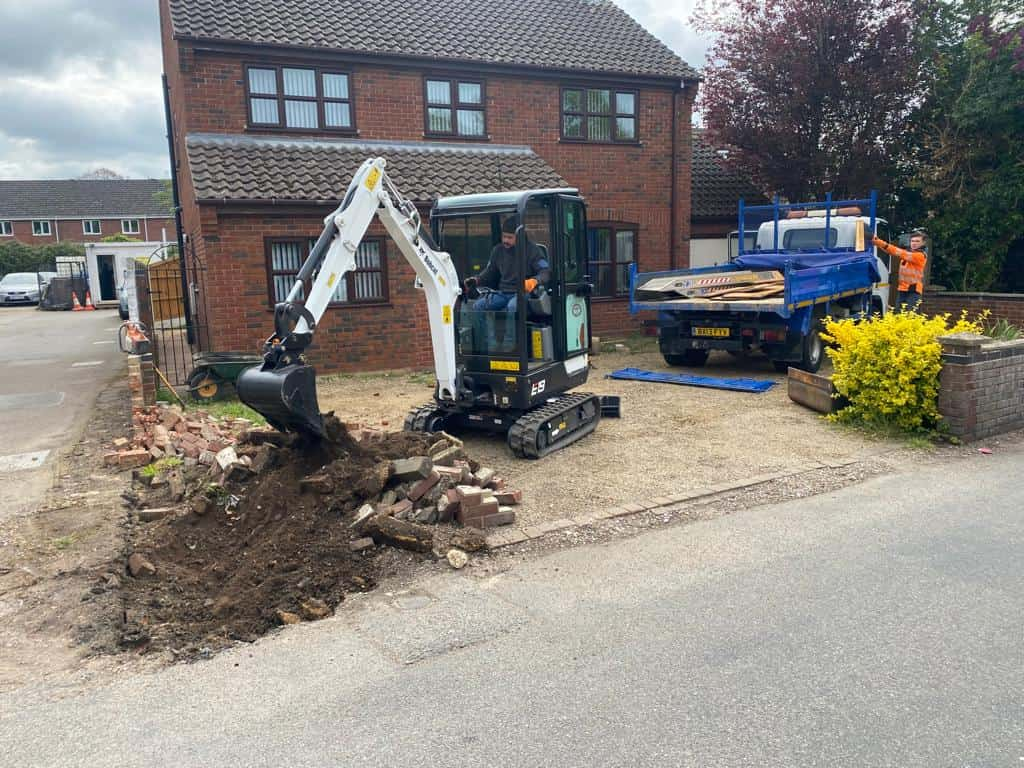Tarmac or Block Paving: Which One Suits Your Home Better?
When it comes to choosing the right material for your driveway, both tarmac and block paving offer unique advantages and aesthetics. However, determining which option best suits your home requires a thoughtful examination of your specific needs, budget, and personal preferences. At Cranfield Driveways & Patios, we specialise in providing high-quality driveway installations in Cranfield, Bedfordshire. In this blog post, we’ll explore the key differences between tarmac and block paving, helping you make an informed decision for your property.
1. Aesthetics and Design Options
Tarmac Driveways:
- Tarmac, or asphalt, offers a sleek and modern appearance. Its smooth black surface provides a clean look that can complement a variety of home styles.
- While the colour options for tarmac are limited, you can add decorative aggregates or stones to enhance the visual appeal, although this is less common.
Block Paving Driveways:
- Block paving is renowned for its versatility and aesthetic appeal. Available in a wide range of colours, shapes, and patterns, block paving allows you to customise your driveway to match your home’s exterior.
- This option offers a more traditional and sophisticated appearance, making it an attractive choice for homeowners looking to enhance their property’s curb appeal.
Conclusion: If aesthetics and design flexibility are important to you, block paving may be the better choice. However, if you prefer a simple, modern look, tarmac could suit your needs.
2. Durability and Longevity
Tarmac Driveways:
- Tarmac driveways are generally durable and can withstand heavy traffic, making them a practical choice for homes with multiple vehicles.
- With proper maintenance, including regular sealing, a tarmac driveway can last around 15 to 20 years. However, it may require resurfacing every few years to maintain its integrity.
Block Paving Driveways:
- Block paving is highly durable and resistant to cracking, which makes it suitable for a variety of weather conditions. Each block can move slightly, allowing the surface to adjust to changing conditions without significant damage.
- A well-installed block paving driveway can last for 25 years or more with minimal maintenance.
Conclusion: If you are looking for longevity and durability, block paving generally outperforms tarmac, especially in terms of resistance to cracking and shifting.
3. Maintenance Requirements
Tarmac Driveways:
- Tarmac driveways require relatively low maintenance. Regular cleaning to remove dirt and debris is usually sufficient.
- However, they may develop cracks over time due to environmental factors. Prompt repairs are essential to prevent further damage.
Block Paving Driveways:
- Block paving requires more maintenance than tarmac. While it is easy to clean, the joints between the blocks can become overrun with weeds, requiring occasional weeding or the application of a weed-resistant solution.
- Depending on usage, block paving may also require re-sanding every few years to maintain the appearance and stability of the surface.
Conclusion: If you prefer a low-maintenance option, tarmac may be more appealing. Conversely, block paving requires more upkeep but can be easier to repair if individual blocks become damaged.
4. Cost Considerations
Tarmac Driveways:
- Tarmac is typically more affordable than block paving, both in terms of materials and installation costs. This makes it an attractive option for homeowners on a budget.
- However, while the initial investment is lower, you should consider potential future costs for resurfacing and repairs.
Block Paving Driveways:
- Block paving tends to have a higher initial cost due to the price of materials and the more labour-intensive installation process.
- However, the durability and long lifespan of block paving can make it a cost-effective choice in the long run, as it may require fewer repairs and maintenance.
Conclusion: If upfront costs are a significant factor, tarmac may be the way to go. However, block paving offers better value over time due to its durability and aesthetic appeal.
5. Installation Process
Tarmac Driveways:
- Installing a tarmac driveway typically involves a quicker and simpler process. The surface is laid in a single layer, allowing for faster installation and minimal disruption to your routine.
- This is an ideal option if you need a new driveway in a shorter time frame.
Block Paving Driveways:
- Block paving installation is more intricate and time-consuming, as each block is laid individually. This allows for greater design flexibility but may take longer to complete.
- While the installation might take more time, it ensures a more precise and aesthetically pleasing result.
Conclusion: If you require a fast installation, tarmac is likely the better choice. However, for a beautifully designed driveway, block paving is worth the wait.
Conclusion: Making the Right Choice for Your Home
Both tarmac and block paving have their advantages, and the right choice ultimately depends on your preferences, budget, and the specific requirements of your property. At Cranfield Driveways & Patios, we are committed to helping you choose the best driveway solution that meets your needs and enhances your home’s curb appeal.
If you’re considering a new driveway and would like expert advice on the best materials for your property in Cranfield, Bedfordshire, contact us today. Our experienced team is here to help you create a stunning, functional driveway that lasts for years to come.
Call us on: 01234 639 390
Click here to find out more about Cranfield Driveways & Patios
Click here to complete our contact form and see how we can help with your Driveway needs.

